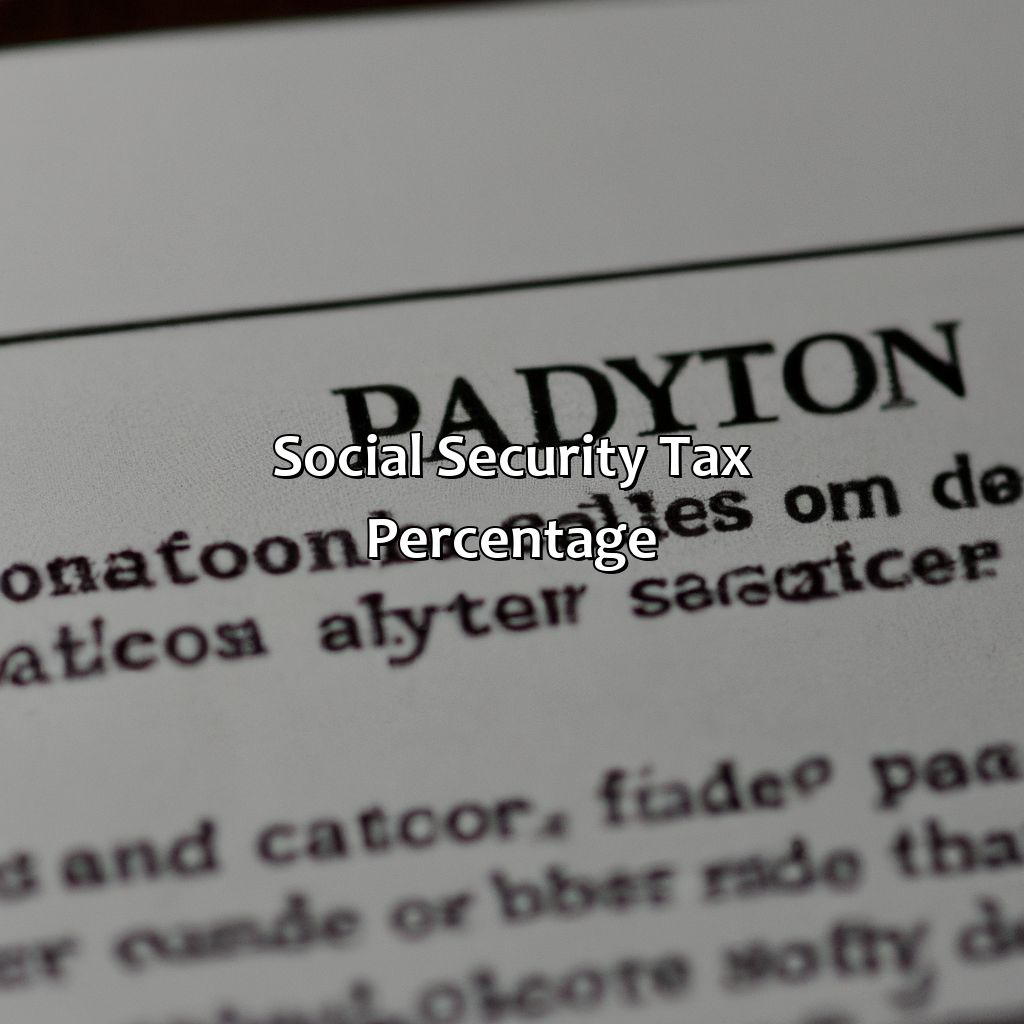What Is Social Security Tax Percentage?
Key Takeaway:
- Social Security tax is a payroll tax that is collected with the aim of providing retirement benefits, disability benefits, and survivor benefits to eligible recipients.
- The Social Security tax percentage is currently set at 6.2% for employees and 12.4% for self-employed individuals. The tax is calculated based on the individual’s earnings and is collected by the government.
- The Social Security tax percentage rates may change from year to year, so it is important to stay updated with the latest information. Additionally, there are income limits for Social Security tax and the tax is collected automatically by employers for employees.
Learning about Social Security taxes is essential for any taxpayer. You may be wondering what the exact percentage of Social Security taxes you are required to pay is. This article provides the answer and advice on how to make sure you are paying the right amount.
Social Security Tax Definition
Social Security Tax refers to the tax levied on earned income to finance Social Security programs, which provide retirement, disability, and survivor benefits to eligible individuals. The amount of Social Security Tax is based on a percentage of one’s total income, and the current rate is 12.4%, split equally between employers and employees. It is essential to note that self-employed individuals are responsible for paying the full 12.4% Social Security Tax.
The Social Security Tax percentage is calculated by multiplying one’s income by the tax rate and then dividing the result by 100. For example, if an individual’s income is $50,000, their Social Security Tax would be $6,200 (12.4% of $50,000). The tax is imposed on a maximum income limit, which is $142,800 for the year 2021.
It is crucial to understand that Social Security Tax is different from Medicare Tax, which is another payroll tax that funds medical coverage for eligible individuals. The Medicare Tax rate is 2.9%, split equally between employers and employees, and there is no ceiling on the income subject to the Medicare Tax.
Since its inception in 1935, Social Security has been a vital resource for retired and disabled workers and their families. The taxes paid by current workers fund the benefits received by current beneficiaries. Social Security Tax ensures that eligible individuals receive economic security throughout their retirement years, supporting them and their families.

Image credits: retiregenz.com by Joel Washington
Social Security Tax Percentage
Social Security Tax Percentage refers to the portion of an employee’s income that is deducted to fund the social security program. As of 2021, the Social Security Tax rate is 6.2% for both employees and employers, up to a maximum income cap of $142,800. Self-employed individuals pay both the employee and employer portion, amounting to a total of 12.4%. It is important to note that the Social Security Tax rate can change annually, so it is crucial to stay updated on current rates.
Employers are responsible for withholding the Social Security Tax from employees’ paychecks and remitting the funds to the government. The money is used to fund Social Security benefits such as retirement, disability, and survivor benefits. While the Social Security Tax is mandatory, there are exemptions available, such as for certain religious groups or those who receive income from a foreign government.
It is worth noting that Social Security benefits are based on an individual’s average earnings over their lifetime, with higher earners receiving larger benefits. However, there is a maximum benefit amount that is adjusted annually.
In addition, it is important to plan and save for retirement as Social Security benefits may not fully cover an individual’s expenses. A financial advisor can assist with creating a retirement plan that accounts for Social Security benefits and other sources of income.
A colleague of mine, who was self-employed for several years, shared their experience of the Social Security Tax. They initially underestimated the impact of the tax on their income and were caught off-guard by the self-employment tax rate of 12.4%. They advised others who are self-employed to plan accordingly and factor in the tax rate when setting their prices and creating their budgets.

Image credits: retiregenz.com by David Arnold
Social Security Tax Limits
Social Security tax, a.k.a FICA tax, is the tax that is levied on all employees’ wages and self-employed individuals’ net earnings to provide income benefits during retirement, disability, or death. This tax applies to all income up to a limit, known as the Social Security Tax Limit, which is adjusted annually based on inflation. For the year 2021, the Social Security Tax Limit is $142,800, which means that any income above this limit is not subject to Social Security tax.
The Social Security tax limit has been in place since 1937, when it was introduced as part of the Social Security Act. The purpose of this limit is to ensure that higher-income individuals pay their fair share of taxes into the Social Security system, while also providing a safety net for individuals at the lower end of the income spectrum.
It is essential to understand that the Social Security tax is not a fixed percentage, but it is calculated at a rate of 6.2% of the employee’s income for all wages and salaries earned up to the Social Security Tax Limit. The employer also pays an equal amount of 6.2%, resulting in a total of 12.4% Social Security tax on the employee’s income. Self-employed individuals are responsible for paying both the employer and employee portion of this tax, resulting in a total of 12.4%.
In addition to the Social Security tax, employees and self-employed individuals are also required to pay an additional Medicare tax of 1.45% on all wages and salaries earned. Employers also need to pay an equal amount of 1.45% on behalf of the employees. Individuals with high-income earnings beyond a threshold may also be subject to an additional Medicare tax.

Image credits: retiregenz.com by Adam Jones
Five Facts About Social Security Tax Percentage:
Social Security tax, also known as FICA tax, is a payroll tax that funds retirement, disability, and survivor benefits for American workers. (Source: IRS)
The Social Security tax rate for employees and employers is 6.2% each, for a total of 12.4%. (Source: Social Security Administration)
There is a Social Security tax cap, which means that earners above a certain amount do not have to pay Social Security taxes on that extra income. (Source: Forbes)
Self-employed individuals pay both the employee and employer share of Social Security taxes, which is a total of 12.4%. (Source: Investopedia)
The Social Security tax rate is subject to change each year based on updates to the Social Security wage base. (Source: SSA)
FAQs about What Is Social Security Tax Percentage?
What is social security tax percentage?
The social security tax percentage is a payroll tax that is deducted from an employee’s paycheck to help fund the social security program. As of 2021, the social security tax rate is 6.2% for employees and employers, with a maximum taxable income of $142,800.
How is the social security tax percentage calculated?
The social security tax percentage is calculated as a percentage of an employee’s gross wages, up to a certain maximum amount. For 2021, the maximum taxable earnings subject to social security tax is $142,800. If an employee earns more than this amount, they will not be subject to social security tax on their earnings above that threshold.
Are there any exemptions to the social security tax percentage?
In general, most workers are subject to the social security tax percentage. However, there are a few exemptions, such as certain public sector employees who are covered under a different retirement plan, as well as some religious groups who have opted out of the social security system.
What is the purpose of the social security tax percentage?
The social security tax percentage is used to fund the social security program, which provides retirement, disability, and survivor benefits to eligible workers and their families. The tax revenue collected from employees and employers is used to pay for these benefits, as well as to cover the administrative costs of the program.
Can I deduct my social security tax percentage on my tax return?
No, you cannot deduct the social security tax percentage that you pay on your tax return. This tax is considered a payroll tax and is not deductible on your federal income tax return.
What happens if I overpay my social security tax percentage?
If you overpay your social security tax percentage, you can claim a refund for the excess amount on your tax return. However, it is important to note that overpayments can occur for a variety of reasons, such as an error in payroll processing or an incorrect calculation of your taxable earnings. If you believe that you have overpaid your social security taxes, you should contact your employer or the Social Security Administration to have the issue resolved.
 Checkout this IRS Loophole
Checkout this IRS Loophole 
